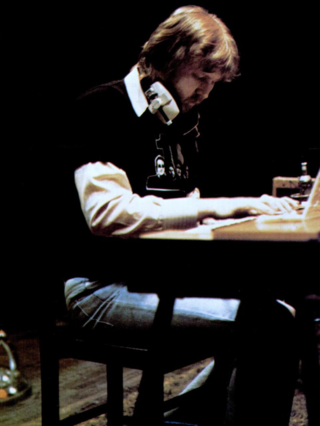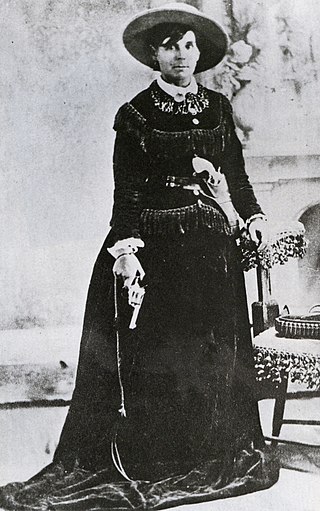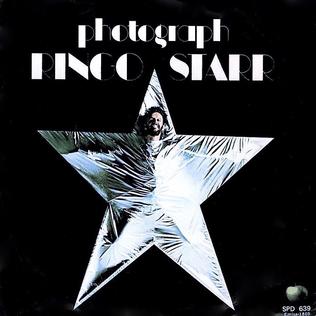Other
- Another term for the Egyptian underworld of Duat
Land of the Dead is another term for the afterlife or underworld.
Land of the Dead or The Land of the Dead may also refer to:

Sir Richard Starkey, known professionally as Ringo Starr, is an English musician, songwriter and actor who achieved international fame as the drummer for the Beatles. Starr occasionally sang lead vocals with the group, usually for one song on each album, including "Yellow Submarine" and "With a Little Help from My Friends". He also wrote and sang the Beatles songs "Don't Pass Me By" and "Octopus's Garden", and is credited as a co-writer of four others.

The Beatles were an English rock band formed in Liverpool in 1960. The core lineup of the band comprised John Lennon, Paul McCartney, George Harrison and Ringo Starr. They are widely regarded as the most influential band of all time and were integral to the development of 1960s counterculture and the recognition of popular music as an art form. Rooted in skiffle, beat and 1950s rock 'n' roll, their sound incorporated elements of classical music and traditional pop in innovative ways. The band also explored music styles ranging from folk and Indian music to psychedelia and hard rock. As pioneers in recording, songwriting and artistic presentation, the Beatles revolutionized many aspects of the music industry and were often publicized as leaders of the era's youth and sociocultural movements.

Underworld are a British electronic music group formed in 1987 in Cardiff, Wales and the principal collaborative project of Karl Hyde and Rick Smith. Prominent former members include Darren Emerson, from 1990 to 2000, and Darren Price, as part of the live band from 2005 to 2016.

Harry Edward Nilsson III, sometimes credited as Nilsson, was an American singer-songwriter who reached the peak of his success in the early 1970s. His work is characterized by pioneering vocal overdub experiments, a return to the Great American Songbook, and fusions of Caribbean sounds. Nilsson was one of the few major pop-rock recording artists to achieve significant commercial success without performing major public concerts or touring regularly.

Layne Thomas Staley was an American singer and songwriter who was the original lead vocalist of Alice in Chains, which rose to international fame in the early 1990s as part of Seattle's grunge movement. He was known for his distinctive vocal style as well as his harmonizing with bandmate Jerry Cantrell. Prior to his success with Alice in Chains, Staley was also a member of the glam metal bands Sleze and Alice N' Chains. He was also a part of the supergroups Mad Season and Class of '99.

Myra Maybelle Shirley Reed Starr, better known as Belle Starr, was an American outlaw who gained national notoriety after her violent death.
The underworld is a place in religion and mythology to where the souls of the recently departed go.
Hell, in many religions, is a place of suffering during the afterlife, where wicked or unrighteous souls are punished.

William Everett Preston was an American keyboardist, singer and songwriter whose work encompassed R&B, rock, soul, funk, and gospel. Preston was a top session keyboardist in the 1960s, backing Little Richard, Sam Cooke, Ray Charles, the Everly Brothers, Reverend James Cleveland, the Beatles and the Rolling Stones. He gained attention as a solo artist with hit singles "That's the Way God Planned It", the Grammy-winning "Outa-Space", "Will It Go Round in Circles", "Space Race", "Nothing from Nothing", and "With You I'm Born Again". Additionally, Preston co-wrote "You Are So Beautiful", which became a No. 5 hit for Joe Cocker.
Twist may refer to:
Operator may refer to:
After may refer to:
"Act Naturally" is a song written by Johnny Russell, with a writing credit given to Voni Morrison and publishing rights transferred to Buck Owens. It was originally recorded by Buck Owens and the Buckaroos, whose version reached number one on the Billboard Country Singles chart in 1963, his first chart-topper. In 2002, Shelly Fabian of About.com ranked the song number 169 on her list of the Top 500 Country Music Songs.

"Photograph" is a song by English rock musician Ringo Starr that was released as the lead single from his 1973 album Ringo. Starr co-wrote it with George Harrison, his former bandmate from the Beatles. Although they collaborated on other songs, it is the only one officially credited to the pair. A signature tune for Starr as a solo artist, "Photograph" was an international hit, topping singles charts in the United States, Canada and Australia, and receiving gold disc certification for US sales of 1 million. Music critics have similarly received the song favourably; Stephen Thomas Erlewine of AllMusic considers it to be "among the very best post-Beatles songs by any of the Fab Four".

Stop and Smell the Roses is the eighth studio album by English rock musician Ringo Starr. Released in October 1981, it followed the twin commercial failures of Ringo the 4th (1977) and Bad Boy (1978). The album includes the hit single "Wrack My Brain", written and produced by George Harrison, but otherwise failed to find commercial success. It also includes contributions from Paul McCartney, Harry Nilsson, Ronnie Wood and Stephen Stills.

"Back Off Boogaloo" is a song by the English rock musician Ringo Starr that was released as a non-album single in March 1972. Starr's former Beatles bandmate George Harrison produced the recording and helped Starr write the song, although he remained uncredited as a co-writer until 2017. Recording took place in London shortly after the pair had appeared together at Harrison's Concert for Bangladesh shows in August 1971. The single was a follow-up to Starr's 1971 hit song "It Don't Come Easy" and continued his successful run as a solo artist. "Back Off Boogaloo" peaked at number 2 in Britain and Canada, and number 9 on America's Billboard Hot 100. It remains Starr's highest-charting single in the United Kingdom.
Blaze of Glory may refer to:
Other often refers to:
Dead Man Walking or Dead Man Walkin' or Dead Men Walking may refer to:

The ancient legend of Orpheus and Eurydice concerns the fateful love of Orpheus of Thrace for the beautiful Eurydice. Orpheus was the son of Oeagrus and the muse Calliope. It may be a late addition to the Orpheus myths, as the latter cult-title suggests those attached to Persephone. The subject is among the most frequently retold of all Greek myths, being featured in numerous works of literature, operas, ballets, paintings, plays, musicals, and more recently, films and video games.